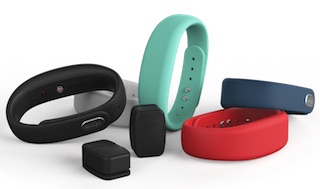 Mountain View, California-based Amiigo, which makes an activity tracker that raised $580,000 on Indiegogo in 2013, has teamed up with online patient community platform Alliance Health to launch a new study looking at the combined effect of wearables and peer support on heart failure patients.
Mountain View, California-based Amiigo, which makes an activity tracker that raised $580,000 on Indiegogo in 2013, has teamed up with online patient community platform Alliance Health to launch a new study looking at the combined effect of wearables and peer support on heart failure patients.
“There are a lot of different questions we can begin to ask related to the value of a social networking platform like ours and bringing that together with Amiigo’s wearable devices which, as you may know, are quite robust in the context of today’s wearables market,” David Goldsmith, VP of Corporate Strategy and Business Development at Alliance Health told MobiHealthNews. “…. What happens if we bring those two different capabilities to bear on this population, and give people the opportunity to talk to one another about how they interpret the data, what kinds of decisions are influenced by seeing some of this data, whether this is even relevant to them and if so in what ways?”
About 100 patients will participate in the pilot, which will last 90 days. Patients already active in an Alliance Health community for heart failure, hypertension, or atrial fibrillation will receive devices in the mail that they can use to measure activity, heart rate, blood pressure variations, oxygen saturation, and respiratory rate. The Amiigo bracelet and shoe clip measure activity continuously while measuring other vital signs intermittently.
Though there isn’t a specific data architecture for sharing the data on the social networking platform, patients will be encouraged to talk about it to the degree that they feel comfortable. Alliance Health also has a space for patients to record subjective data about their health.
“Very broadly, we’re hoping to evaluate the correlation between these physiological parameters and subjective reports of the patient’s conditions and stress levels,” Abe Carter, CEO and cofounder of Amiigo, told MobiHealthNews. “And on the peer support side, we have the opportunity to look at a population that might be similar to a population we’re monitoring in a more clinical setting, where we lack the peer support and social engagement, and kind of compare the physiological data between those two cohorts and the lifestyle data as well.”
Goldsmith said that some online patient communities are made up of self-tracking superusers. Alliance Health's users, by contrast, are more representative of typical patients.
“I think that makes for a much more interesting use case, frankly, because part of what we want to look at is what kind of adoption can we drive, and how can we leverage the support network to help patients understand the value by virtue of connecting to other patients or to even talk about the challenges of using the device, what they can learn from it,” he said. “To really understand from their perspective how this can be integrated into their life in a meaningful way.”
Similarly, heart failure was chosen because CHF patients aren't typically already consistently engaged with their health.
“If you look at a typical diabetes patient, they’re testing on a daily basis. They’ve got well-defined metrics that they have to factor into their lives on a regular basis, HbA1c levels, blood glucose levels, and, of course, making day to day daily judgement calls about their diet, their medication, etc. So the engagement profile we see with that patient community is different than those who are dealing with a heart condition, which is for many patients, other than those dealing with hypertension, it’s much more intermittent, and in some cases it’s even a one-time event in their lives,” he said.
This trial is a setup for a more robust trial of Amiigo’s device with Scripps Translational Science Institute, Carter told MobiHealthNews. Amiigo is in the process of seeking FDA clearance for its device, which uses an algorithm to distinguish between different sorts of motion.
“When we started out, fitness was a low-hanging fruit,” Carter said. “We’re still obviously huge advocates for fitness and exercise. Exercise can have a tremendous positive outcome on atrial fibrillation, hypertension and heart failure. But we’ve always envisioned a healthcare application for Amiigo. It was just a matter of building up the system and being able to lay the foundation for that application. In the beginning we thought of it as a little bit further down the line than it was, but we saw the clinical application in an internal evaluation we did early on, and went after it.”


















